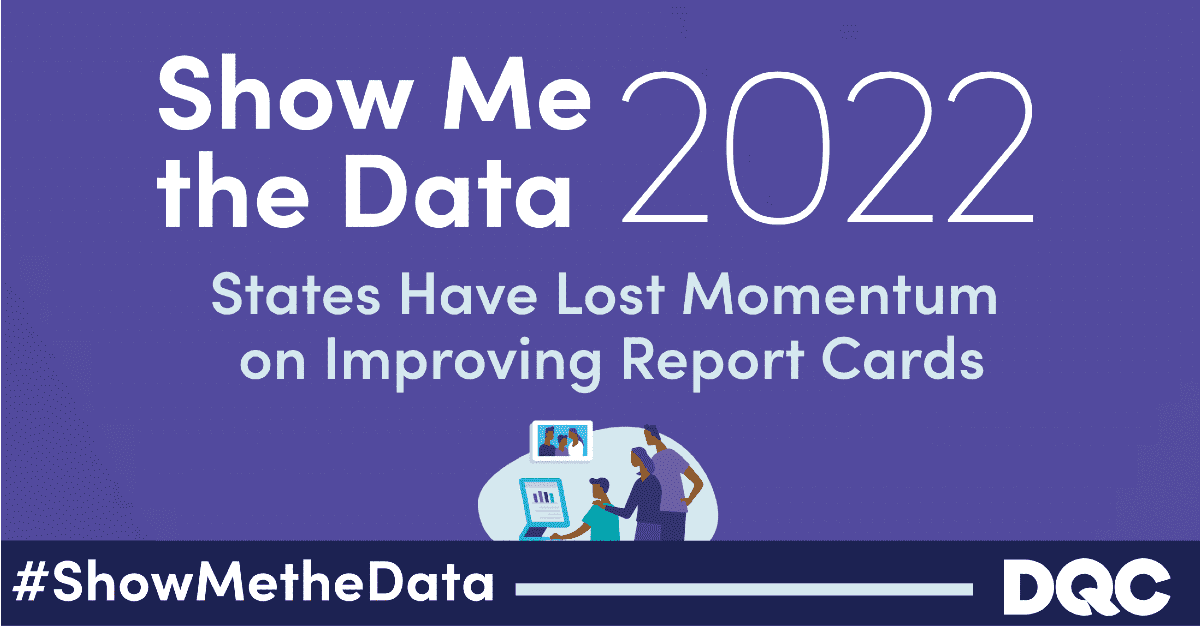Data Quality Campaign’s Show Me the Data 2022 report calls on states to recommit to transparency and on federal leaders to help states refocus
WASHINGTON (May 24, 2022) – During this time of recovery from education disruption, access to data is more valuable than ever. Leaders are using data to make decisions about how to support recovery efforts that get students back on track, and the public needs to understand how schools are supporting students. But states haven’t kept up their end of the bargain by providing this information to the public on their report cards, and the US Department of Education hasn’t used its resources to help states push beyond a focus on compliance. As a result, report cards remain difficult to find, use, and understand. During an ongoing health and economic crisis, that is not acceptable.
In our Show Me the Data 2022 report, the Data Quality Campaign (DQC) reviewed report cards from all 50 states and the District of Columbia to see how states are sharing information with the public. This year, our review uncovered that states have lost momentum on improving their report cards, and families are being left in the dark. Despite flexibility on 2021 report card timelines, timely information on student academic performance is the bare minimum that states should be including on their report cards. States largely failed to provide context for how schools are supporting students during recovery and, if data is not available, explain why.
“The last few years have been difficult for families, educators, and leaders. But not sharing information—and in some cases, sharing less information than in years past—only makes the situation more difficult,” said DQC President and CEO Jennifer Bell-Ellwanger. “States cannot leave families in the dark by leaving information on academic achievement off of their report cards. Families deserve this information, even if it doesn’t paint a rosy picture of education right now.”
State report cards are a federal requirement, and it’s time for the federal government to step in. By providing investment and support to states, and pressure to hold states accountable for what is federally required, the federal government can fulfill the intention of the Every Student Succeeds Act (ESSA) and ensure that students, families, and the public are getting the information they need.
After years of pressure and the requirement to break down data by all groups of students, report cards still lack this information. DQC’s analysis of 2021 report cards found that only 28 states disaggregated achievement data by all federally required student groups—an increase of three from 2019. While this increase seems like good news, the reality is that nine states added this information to their report cards while six states removed it.
Although most states have updated their report cards, many are missing key information about the 2020–21 school year. Of the 43 states that had already published 2021 report cards, we found:
- 16 states did not include 2021 assessment data.
- 25 states did not include 2021 high school graduation rates.
- 26 states did not include 2020–21 chronic absenteeism data.
State report cards remain difficult for families to find, use, and understand. DQC’s analysis identified the following ongoing issues with 2021 report cards:
- Data is often spread across different parts of report card websites, which are frequently clunky and slow and require reloading to find information from different schools or years.
- Of the 25 states that included some form of translation, only seven states had translations that were considered high quality (e.g., they were not provided by Google Translate, and they included all labels and descriptions).
- While most states acknowledged the impact of the pandemic on reporting and the availability and quality of data, few provided data on the measures that families really need to understand: student access to learning, technology, and supports in the 2020–21 school year.
“Report cards were codified into federal law in 2015 but states still consistently fail to provide all of the information that families need. While states have invested time and money into these resources, it’s clear that state leaders need additional support to truly fulfill the promise of report cards,” said Bell-Ellwanger. “Federal leaders should prioritize working with states to ensure they are meeting all of the requirements, supporting states to recommit to courage over compliance.”
View the full Show Me the Data 2022 report here.
###
The Data Quality Campaign is a nonprofit policy and advocacy organization leading the effort to ensure that data works for everyone navigating their education and workforce journeys. For more information, go to dataqualitycampaign.org and follow us on Facebook and Twitter.


